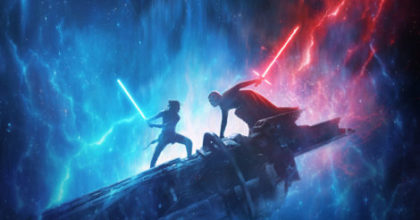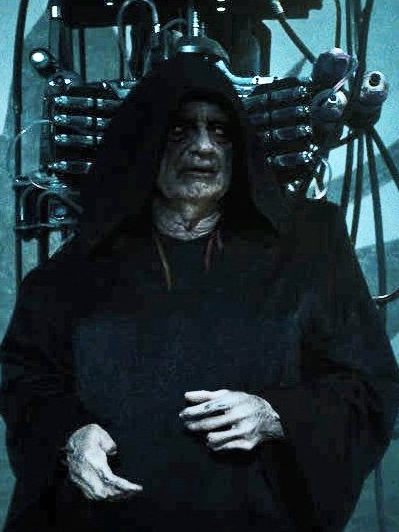
Welcome back to the ongoing Emerging Scholars Network Sci-Fi Film Festival! I’m having conversations on various classic and current science fiction movies. Feel free to watch along and join the conversation. This week’s film is 2019’s Star Wars: Episode IX – The Rise of Skywalker. The conclusion of the 40+ year Star Wars saga was too big for one guest, so this week I’m joined by previous contributors Mike Beidler and Sam Blair and new addition to the festival Will Rose. The conversation was also two big for one post, so this week we’ll take a look at the Dark Side of the Force before turning to the Light next week.
For me, The Last Jedi was a meditation on failure and trauma. How would you summarize the themes of The Rise of Skywalker (TRoS)?
Mike Beidler: TRoS was, in my opinion, a meditation on free will and the redeeming power of love.
Sam Blair: That is one major theme in the film: destiny versus choice. Rey is confronted by her own darkness and desires, as well as her own heredity as we learn. And we definitely see another side of Poe as he struggles under the weight of his mantle of leadership.
MB: When Rey returned to Ahch-To in Ben’s TIE fighter and torched it with the intent of following Luke’s hermitic footsteps, Luke revealed to her that Leia knew Rey was a Palpatine and trained her anyway, trusting that Rey would remain in the light and not succumb to some sort of hereditary destiny “rut.” Luke also broke that mold in Return of the Jedi (although he temporarily discipled himself to a “reborn” Emperor Palpatine in Tom Veitch and Cam Kennedy’s Dark Empire comic series, which Disney relegated to non-canon in 2014).
Will Rose: I agree with what has been said. One of my daughters leaned over to me at the end of the movie and said, “There was a lot of rising in that movie,” alluding that people died and “rose again” a lot in the movie. Even those who we thought died (Chewie) or were getting their memory wiped (C-3PO) eventually were brought back relatively quick. Rising is a big theme, but I also think the theme of “finding a home with friends and family” is another big one. The movie proclaimed a few times “they (the Empire/Evil/Dark Side) win when they make you feel alone.” And it seemed like every time one of the characters tried to do something on their own things went badly. There was a running theme of “you are not alone” with the characters journeying together as well with the climax of the movie. Rey’s first words in the movie were “be with me” and then the statement, “They aren’t with me.” But by the end of the movie we hear the great cloud of Jedi witnesses stating pretty clear, “We are with you! You are not alone in this fight!”
Andy Walsh: Family and community were certainly emphasized, and notably not necessarily as a contrast between the Light and Dark. Kylo had his Knights of Ren. The Emperor had his armada and his throng of chanters, and claimed the support of his Sith predecessors. The differences are more in the dynamics of the relationships.

We open with the revelation that Emperor Palpatine has survived or returned. Does this lessen the impact of Vader’s sacrifice to defeat him in Return of the Jedi?
MB: John 15:13 (NET) says, “No one has greater love than this—that one lays down his life for his friends.” As someone who has spent nearly all of his adult life in the military, I can tell you this: Losing a battle against an enemy does nothing to lessen the impact of one’s loving self-sacrifice. (True love is the greatest thing in the world. Except for a nice MLT—mutton, lettuce and tomato sandwich—where the mutton is nice and lean and the tomato is ripe. They’re so perky, I love that.)
WR: I don’t think it lessens it. He could have died, and then like force ghosts he returns somehow in a different way to get revenge. You could tell he couldn’t fully survive unless he was restored by Rey and Ben, so he was defeated pretty badly and tethered to something to keep going. I think Vader did bring balance to the force, but all things do not stay in balance all the time. There is a rhythm of light and dark working with and against each other throughout this series.
SB: I think it is also reasonable to ask if something is only good if it is effective. If Vader knew that Palpatine could return, and this is reasonable given that Palpatine was the one who turned Anakin precisely because he could teach him to cheat death, I don’t think that negates the rightness or the nobility of his sacrifice.
MB: I find interesting Luke’s own omission, throughout The Last Jedi or The Rise of Skywalker, of any reference to the idea that Vader’s sacrifice was in vain, even amidst his own perceived failures as a Master or Palpatine’s own “rise” manifested in Ben Solo’s percolating darkness. He cast no aspersions toward his monstrous father for making a useless sacrifice.
WR: Right. I’m not sure Vader/Anakin was trying to “kill” Palpatine as much as he was trying to save his son. He did, and in turn his son saved him. They were more focused on one another than whether Darth Sidious was able to defeat death.
AW: There certainly were suggestions in the prior films that Palpatine would have a different relationship with mortality. And I’m reminded that plenty of other stories—Lord of the Rings and Harry Potter to name just two with similar cultural footprints—deal with lingering or recurring evil. Certainly the selfishness of self-preservation at the cost of others’ has a long history and a long tradition of being denounced. I wonder also if stories of these sort speak to some kind of fear that whatever good we do might be ultimately undone?
MB: Andy, having the good I’ve accomplished ultimately undone has always been a concern of mine, both personally and professionally. I constantly pray that the words I choose and the actions I model are solid enough morally and ethically to be self-perpetuating in others, and that such examples are “paid forward” in the ones they train (Proverbs 22:6). Such is the curse of being a leader or a teacher. I can’t imagine the Jedi Masters didn’t undergo the heat of their own private “pressure cooker” in terms of hoping the lessons they taught abided and endured within the padawans they instructed.
Palpatine claims to have been influencing Kylo Ren and orchestrating events of the previous films. Does this change Ren’s culpability for his actions?
MB: I don’t think so. Ren’s decision to forgive himself and pursue the light proves that Palpatine’s influence wasn’t total. As for Ren’s culpability, one could argue, from a Hebrew perspective, that Ren remained guilty of his crimes against the innocent even though Palpatine was pulling the strings. Likewise, God’s use of the Babylonians to punish Israel for her sins didn’t relieve the Babylonians of their crimes against Israel (cf. Jeremiah 25:9-14; 50:9, 17-20).
AW: I think especially in serial fiction, because of the need to do something new with a long-running plot and characters, there is a trope of the hero turning bad. There is a lot of shock value, if nothing else, in seeing Captain America following orders from the Red Skull, for example. But in the long run, the hero still needs to be the hero, and so the convention is that what you do when mind-controlled doesn’t really count. The exact nature of Palpatine’s influence on Ren is not as clear and probably isn’t as complete as the full mind control in other stories, but I think it would be easy to apply a similar logic if one is used to that kind of storytelling. So I think it’s good to be reminded that the real world operates on different standards.
MB: You’re right, Andy, in that we don’t know the extent to which Palpatine controlled Ren, but I can’t help but consider the movie’s chronology: Ren made his choice to let his own past die while Palpatine was alive, well, and puppeteering.
SB: The issue of control and culpability has been a major theological concern in Reformed theology, especially for those who hold that God causes and controls all things, good and bad. We see this not only in God’s use of Babylon but also in the Exodus narrative of Pharaoh. We are told that God “hardens his heart” but also that he is responsible for his own actions. The two don’t seem compatible. Typically theologians have held that God doesn’t direct us away from what our will would be anyway, and given that our wills are bent and broken, we are naturally bent towards evil. Kylo’s own brokenness would make us see him as responsible, and perhaps Palpatine merely pushed him in the direction he would have gone anyway. It does make you want to look at the prior films with Palpatine’s words in mind to see where that influence may have been and how strong it was.
WR: I think it lets Ben off the hook a little bit. It softens the unspeakable sin of killing Han. But with him having Skywalker blood, it’s natural for him to wrestle with the Dark Side.
AW: The killing of Han is the crux, isn’t it? We’ve seen the First Order destroy worlds, but we can attribute that to Snoke or General Hux more directly. Thus his reconciliation with Han is probably equally critical to accepting that Ren/Ben can come towards the light. That moment is somewhat distinct from the visual language of other Force ghosts though; I wonder if we are meant to consider the possibility that it is Ben forgiving himself.

Ultimately, Kylo Ren opposes Palpatine and sacrifices his own life so that Rey can live. Is it helpful to think of this as a redemptive arc, or is his a different sort of story?
SB: I think it is redemptive, but at the same time it left me feeling unfulfilled. Both Rey and Ren sacrifice themselves for the other, yet Kylo’s sacrifice is final. I was left feeling that there was some lost potential in Kylo Ren’s story. So much was made about the pair of them and how they represented the balance of the force in many ways. Yet at the end we are left with one side of the balance empty. At the same time, we do see that Kylo moved from wanting Rey to be with him in a position of power to one of him wanting her to live in freedom and compassion.
WR: I think it points to the universal theme that redemption comes with sacrifice. And I think the only way Ben could have been redeemable is via a major sacrifice. If you think about the long saga of Star Wars, each movie has a sacrificial theme’ Kenobi sacrificed himself so Han, Luke and Leia could escape; Vader sacrificed himself for his son Luke; in The Last Jedi, Luke sacrificed himself for Leia and what’s left of the resistance; it appears Leia sacrifices herself for her son in TRoS, and eventually Ben sacrifices himself for Rey.
SB: I think Jesus’ words in Matthew 16, “Whoever wants to save their life will lose it, but whoever loses their life for me will find it,” can summarize so much of the conflict in the films’ major characters: Obi-Wan, Vader, Kylo, Han, Luke, and so on. The more characters try to save themselves or others through the use of power and control, the worse things get. The more they lose themselves in service to others, the better things get.
MB: I have to agree with Sam that, while we believe that there is a redemptive arc in Ben Solo’s story, both The Last Jedi and TRoS failed to provide details regarding the first half of Ben/Kylo/Ben’s arc. All we get are Leia and Han’s brief laments over their son’s mysterious corruption by Snoke, and Luke’s (likely) skewed reminisces of disturbing Ben’s sleep by the green glow and intense heat of a lightsaber. Although we’re getting a better look at that first half-arc with Marvel Comics’ new Star Wars: The Rise of Kylo Ren, it’s a shame that Lucasfilm dropped the cinematic ball in not giving us details of the beginning of Ben Solo’s redemptive story. That’s like reading a Bible that starts with the spiritually adulterous Hebrews and ends with Jesus’ crucifixion and resurrection without showing us where it all began: in the Garden. Sure, we get that Jesus sacrificed himself for his people, but’ why? And to what end?
AW: Lucasfilm does seem curiously willing to allow key story elements to be parceled out across media and platforms. I think Mike is right that it leaves the films, the most visible element of Star Wars storytelling, feeling somewhat incomplete. At the same time, it does reflect our actual life experiences. We generally meet each other in the middle of our respective stories. And we often find ourselves asking the same question of our respective choices: “But’ why?” I wonder if it would help to make more of an effort to tell each other our histories.
Mike Beidler is a retired U.S. Navy commander whose combination of military aviation experience and Star Wars fandom pedigree launched him, beginning in the mid-’90s, into a decades-long relationship with numerous Star Wars authors. His direct contributions to the Star Wars universe include work on Tom Veitch’s Dark Empire saga, A. C. Crispin’s Han Solo trilogy, and John Whitman’s Galaxy of Fear series. He has, in a galaxy far, far away, worked as a forensic specialist for a Hutt crimelord, studied with the B’omarr monks of Tatooine, and hunted down a bounty or two. He has also written about Star Wars and Blade Runner for Sequart Organization. In this galaxy, however, he lives in northern Virginia with his wife and three children and takes advantage of his daily 45-minute commute to/from the Pentagon to read theology and science fiction. Mike is President of the Washington DC chapter of the American Scientific Affiliation (ASA), a contributing writer to BioLogos, and a member of the both the American Association for the Advancement of Science (AAAS) and the National Center for Science Education (NCSE).
Samuel Blair is a full time Chaplain with Bridges Hospice in Pittsburgh, PA, and has been involved in hospice care since 2003. He recently completed certification to become a Board Certified Chaplain and Certified Pastoral Counselor through the Pittsburgh CPSP chapter. He began in hospice care at Connecticut Hospice in Branford, CT where he volunteered during seminary at Yale Divinity School. He has also been involved in geriatric psychology, psychiatric testing, the philosophy of religion, counseling and health care. He received the BS and MA degrees in psychology from Geneva College and the MDiv from Yale Divinity School. He loves music, needs to read more, and tries not to take things so seriously.
Will Rose is the Parish and Administrative Pastor at Holy Trinity Lutheran Church and Lutheran Campus Ministry in Chapel Hill NC. Will has a passion for engaging the intersections of faith, fandom and all things geeky. The first movie he ever saw in the theater was Star Wars “A New Hope” in 1977 and has been a lifelong Star Wars fan ever since. Along with engaging healthy conversation between Faith and Science he also leads a “God Loves Geeks” book club and moderates panels at NC Comic Con in Durham and Raleigh NC.
Andy has worn many hats in his life. He knows this is a dreadfully clichéd notion, but since it is also literally true he uses it anyway. Among his current metaphorical hats: husband of one wife, father of two teenagers, reader of science fiction and science fact, enthusiast of contemporary symphonic music, and chief science officer. Previous metaphorical hats include: comp bio postdoc, molecular biology grad student, InterVarsity chapter president (that one came with a literal hat), music store clerk, house painter, and mosquito trapper. Among his more unique literal hats: British bobby, captain’s hats (of varying levels of authenticity) of several specific vessels, a deerstalker from 221B Baker St, and a railroad engineer’s cap. His monthly Science in Review is drawn from his weekly Science Corner posts — Wednesdays, 8am (Eastern) on the Emerging Scholars Network Blog. His book Faith across the Multiverse is available from Hendrickson.

Leave a Reply